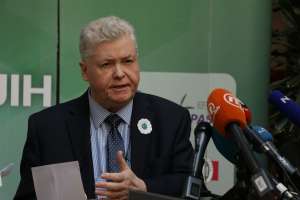SARAJEVO, March 20 (FENA) - The final verdict in the case of the former President of Republika Srpska and Supreme Commander of the RS Army, Radovan Karadžić, for crimes committed in the last war in Bosnia and Herzegovina should be a milestone in the process of reconciliation in BiH, said in an interview with FENA a professor of philosophy and the studies of the Holocaust and Genocide at the State University of Southern Connecticut, and a member of the Steering Committee at Yale University, David Pettigrew.
Interviewer: Hana Imamović
He explained his claim by saying that after the first instance verdict pronounced two years ago, nobody was satisfied with the fact that he was not convicted of genocide in municipalities in the territory of Bosnia and Herzegovina to which the Bosnian Serbs (Republika Srpska) claimed their “lawful right”. He was only sentenced to 40 years in prison.
“However, the disappointment was not lacking when it came to some other judgments of this tribunal, since the sentences were considered rather mild, and many of the accused were released from prison before serving the entire sentence. In some cases, they were welcomed as national heroes,” added Pettigrew.
The Hague Prosecution in its appeal requested that Karadžić is to be found guilty of the first count of the indictment charging him with genocide in Srebrenica and seven other municipalities, but also demanded life imprisonment.
If the Prosecution in The Hague has succeeded in proving it, Pettigrew believes that the victims of genocide orchestrated by Karadžić throughout Republika Srpska would get some kind of justice, which would then open the possibility for the beginning of the process of reconciliation in BiH.
Explaining the reasons why Karadžić should be found guilty of genocide in other municipalities, he cited examples in which the Tribunal, in the pronouncement of verdict, neglected its own and other similar findings.
Respecting the decision to sentence him to a 40-year sentence, the professor agrees with the Prosecution that the sentence was desperately inadequate as it is one of the leaders of a joint criminal enterprise who had a genocidal intention which falls under the scope of the gravest crimes attributed to any person before the Hague Tribunal.
Since he had civil and military powers, Karadžić played a crucial role in the four known joint criminal enterprises. Furthermore, the prospection emphasized the highest level of Karadžić's responsibility based on which Pettigrew affirms his view that Karadžić deserves a life sentence.
The Trial Chamber itself, recalls Pettigrew, acknowledged that Karadžić's crimes "are among the most unimaginable and most serious crimes in international criminal law and include extermination and crimes against humanity and genocide".
Therefore, he underlined that "restorative justice can complement legal justice and facilitate healing and reconciliation in a society," but for such a form of justice to occur, it is crucial that the perpetrator takes responsibility for the crimes committed.
“A minimum for this, in the context of BiH, would include a public statement on accepting the responsibility on behalf of the leadership of Republika Srpska for the war crimes committed,” said Pettigrew.
However, it is a well-known fact that, as he said, that the current leadership of this BiH entity and the incumbent BiH Presidency Chairman deny that genocide had ever been committed in Srebrenica, as well as the siege of Sarajevo.
Because of all this, Pettigrew concludes, Karadžić's sentence to life imprisonment on all counts of the indictment would mean that the highest ranking leader of Republika Srpska is sentenced for the joint criminal enterprise and is considered to be criminally responsible for the plan of removing non-Serbs from RS, the territory which they claimed exclusively for themselves.
In an interview with FENA, Professor Pettigrew has repeatedly said that this would mean that some form of justice has been reached, because it would affirm the truth about genocide in the atmosphere of denial.
He also pointed out that potential conviction under Count 1 of the indictment would also recognize the genocidal intention of Republika Srpska and potentially motivate the international community to take initiatives to prevent the denial of genocide, the glorification of war criminals, hate speech and threats of secession.
"All of these would be initiatives that would pave the way for reconciliation and nation building," concluded Pettigrew in an interview with FENA.
(FENA) S. R.









